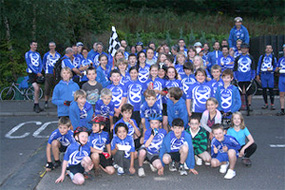The Logie Kirk hill is renowned throughout Central Scotland as one of the steep 'classics' of the region. Although not supremely long, coming in at approx 1 mile, it's the combination of varying gradients that test even the hardiest riders. This combination of gradients also makes Up the Kirk such an unpredictable event; will a skinny mountain goat be victorious due to the lower steeper slopes, or will a powerhouse TTer win it along the final steady drag? The hill can be broken down into a few 5 sections:
(1) 5..4..3..2..1.. GO
With a gentle gradient for the first 200metres, the first section can easily lure a rider into a false sense of security. Sweeping up past the old Logie Kirk graveyard, the gradient stays reasonably steady. Remember not to go too fast though as the real test is only just beginning.
(2)20%+
After flying past the graveyard the road immediately points upwards. Reaching 22% in places, the next 200metres get you wondering why you set off so damn quickly. Thighs burning, gears not low enough, all you can hear is the sound of cowbells and cheering ringing in your ears.
(3) The Switchback
A pivotal point in the race. Mess up your line entering the switchback and the gradient increases to over 30% on the inside! After the switchback, you get a momentary flattening of the gradient for another couple of bends.
(4) When will it end?
Having had 10 seconds to get your breath back on a slightly flatter 50metres, the road goes skywards again, with over 20% gradients. With a few slight bends that all look the same, all hiding more incline, you are never sure when the road will flatten out.
(5) The final drag
By the time the road starts to exit the woodland, you will see the finish line 500 metres in the distance at the end of a long straight drag. People say this is where the race is won or lost. Have you saved enough in the tank to churn out a massive gear to really fly up this drag, or are you still seeing stars? With an average gradient of 8%, this final section is for the power-riders.

